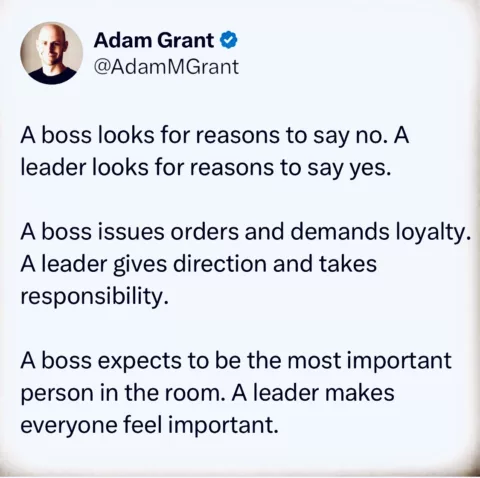When we think of a boss, we often picture someone in charge, giving orders, and demanding obedience. On the other hand, when we think of a leader, we often picture someone who inspires, guides, and empowers others to achieve their goals. While both a boss and a leader have authority over their team, the two have distinct differences. Understanding the difference between a boss and a leader can help us recognize effective leadership and inspire us to become better leaders.
What is a Boss?
A boss holds a position of power and authority in an organization. They are responsible for making decisions and ensuring their team meets its objectives. However, a boss often relies on their position of power to get things done. They may use fear, coercion, or micromanagement to motivate their team, and they often make decisions based solely on their own or the company’s interests.
What is a Leader?
A leader is someone who inspires and motivates others to achieve their goals. They do this by setting an example and providing guidance and support to their team. Unlike a boss, a leader doesn’t rely on their position of power. Instead, they earn respect and trust of their team by demonstrating their competence, integrity, and empathy.
The Difference Between a Boss and a Leader
According to motivational speaker Tony Robbins, there are 5 key differences between a boss and a leader, which are:
- A boss hears, a leader transforms
- A boss speaks, a leader connects
- A boss dictates, a leader inspires
- A boss dominates, a leader collaborates
- A boss wants profit, a leader wants to change the world

In addition, here is how a boss and a leader would use the following tactics differently:
- Motivation: A boss motivates through fear and coercion, while a leader motivates through inspiration and empowerment.
- Decision-making: A boss makes decisions based on their interests or the company’s interests, while a leader makes decisions based on the needs and interests of their team.
- Communication: A boss communicates by giving orders and expecting compliance, while a leader communicates by listening and providing feedback and guidance.
- Delegation: A boss delegates tasks without considering the strengths and weaknesses of their team members, while a leader delegates tasks based on the strengths and interests of their team members.
- Focus: A boss is focused on achieving short-term goals, while a leader is focused on achieving long-term goals and developing the skills and abilities of their team.
Two Examples of a Boss vs. a Leader
Imagine a team has a deadline approaching, and several tasks need to be completed before the deadline. A boss might respond by giving orders and demanding their team work longer hours to finish the job. They might use fear to motivate their team, saying something like, “If we don’t meet this deadline, we’ll all lose our jobs.” Conversely, a leader might respond by working alongside their team and providing support and guidance. They might say, “We have a tight deadline, but I believe in you all. Let’s work together to get this done.” They might also delegate tasks based on their team member’s strengths and interests, resulting in more efficient and effective time use.
Imagine that a team has just completed a major project, which has been a resounding success. The boss might take credit for the win, pointing out how their leadership and guidance led the team to victory. The boss might reward individual team members who performed well without recognizing the contributions of the group as a whole. A leader, adversely, would acknowledge the assistance of the entire team. They would highlight the achievements of each team member and the collective effort that made the project a success. The leader would take time to celebrate the whole team’s success and thank everyone for their hard work.
Why Is It So Easy to Fall into a Boss Position?
The traditional hierarchical structure of many organizations reinforces the idea that those at the top are in charge. In addition, many people are promoted to leadership positions based on their technical expertise rather than their leadership abilities. Then when they do not have the people skills to interact effectively, they rely on their position (i.e. “the boss”) to get things done. The better leaders are at people skills, the more esily they can manage and inspire their team members effectively.
Many also need to understand that leadership is not just about giving orders or being in control but rather about building relationships, inspiring others, and empowering people to reach their full potential. To be a leader, you need to have followers. People follow leaders, not bosses.
Can Leadership Be Taught? How Do You Turn a Boss into a Leader?
Yes, you can teach someone how to be a leader! While some individuals may have a natural inclination towards leadership, it is a skill that can be learned and developed over time through training, coaching, and practice. Many organizations invest in leadership development programs to help their managers and bosses become better leaders.
Training a boss to become a leader often involves a combination of classroom instruction, experiential learning, and ongoing coaching and support. Some possible components of a leadership development program might include:
- Communication skills: Leaders should communicate effectively with their team members, colleagues, and other stakeholders. This might include training on active listening, giving feedback, and public speaking.
- Emotional intelligence: A leader’s ability to understand and manage their own emotions and those of others is critical to building strong relationships and effective teams. Training on emotional intelligence might cover topics such as self-awareness, empathy, and conflict resolution.
- Decision-making and problem-solving: Leaders are often called upon to make tough decisions and solve complex problems. Training in these areas might include techniques such as root cause analysis, brainstorming, and decision matrices.
- Coaching and feedback: Leaders must coach and develop their team members, providing them with feedback and support to help them grow and improve. Training might cover active listening, asking practical questions, and giving constructive feedback.
- Vision and strategy: Leaders must create a compelling vision for the future and develop strategies to achieve it. Training in this area might cover goal setting, strategic planning, and innovation.
- Cultural competence: Leaders have to navigate diverse environments and understand different perspectives. Training in cultural competence might include bias awareness, cross-cultural communication, and inclusive leadership.
It’s worth noting that leadership development is an ongoing process rather than a one-time event. Influential leaders are constantly learning, growing, and evolving; organizations must provide them with ongoing support and development opportunities.
Why Leaders Are Important
Leaders are important because they inspire and empower their teams to achieve their goals. They create a positive work environment where the team feels respected, increasing job satisfaction and productivity. When a leader is present, team members are more likely to be engaged, committed, and willing to go above and beyond to achieve success.
Leadership is also vital for the growth and development of employees. A leader committed to their team’s growth and development can help employees reach their full potential. By providing opportunities for learning and development, a leader can create a culture of continuous improvement and help employees build their skills and knowledge.
Unlock Your Inner Leader
Arden Coaching’s executive coaching programs are designed to help you develop the skills and mindset needed to lead with confidence and purpose. With our expert coaches and personalized approach, we can help you unlock your full potential and achieve your goals.
Don’t settle for being just a boss. Take the leap and become the leader you were meant to be. Contact Arden Coaching today to learn more about our executive coaching programs and start your journey toward becoming an effective and inspiring leader now.

